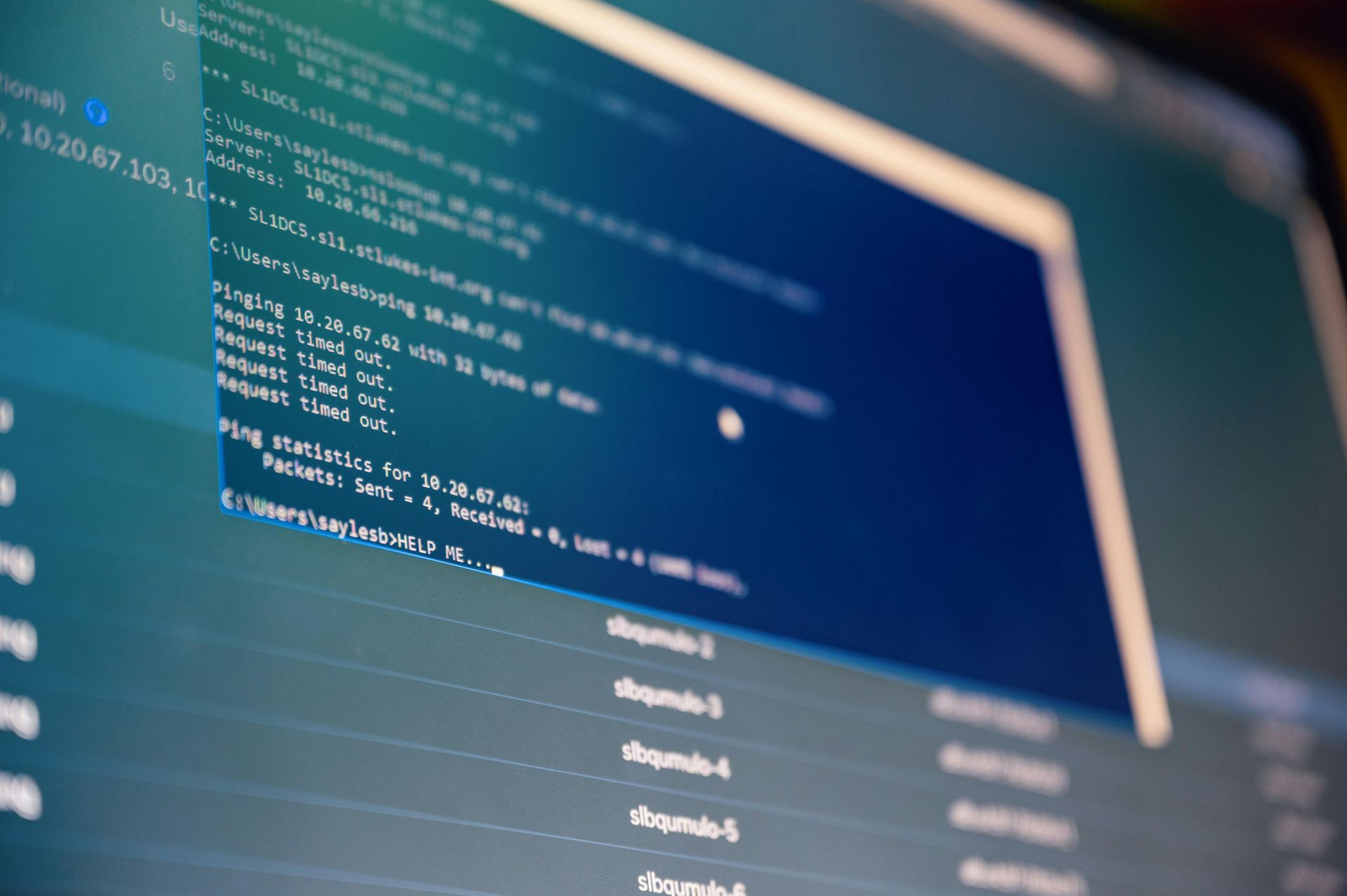Key Cybersecurity Threats Targeting Houston Companies in 2025
Houston's status as America's energy capital, home to the nation's largest medical center, and a major transportation hub makes it an attractive target for cybercriminals in 2025. With four critical infrastructure sectors concentrated in the region, namely, energy, healthcare, transportation, and chemical manufacturing, the city's businesses face unprecedented cybersecurity threats that could disrupt operations across multiple industries simultaneously.
The cybersecurity landscape has evolved dramatically, with threat actors becoming more sophisticated and persistent in their attacks. From AI-powered social engineering to supply chain vulnerabilities, Houston companies must prepare for a new generation of cyber threats that traditional security measures may struggle to combat.
Key Takeaways
- AI-driven attacks will become the dominant threat vector, with cybercriminals using machine learning to create more convincing phishing campaigns and deepfake technology
- Ransomware continues evolving with double extortion tactics specifically targeting Houston's critical infrastructure sectors, including energy and healthcare
- Supply chain attacks pose significant risks to interconnected Houston industries, with attackers exploiting third-party vendor vulnerabilities
- IoT device vulnerabilities create expanded attack surfaces as Houston companies embrace digital transformation across operations
- Zero-trust security models become essential for protecting the remote workforce and cloud infrastructure against sophisticated threat actors
- Cybersecurity talent shortage continues to challenge Houston businesses, making managed security services increasingly valuable for comprehensive protection
AI-Driven Cybersecurity Threats
Artificial intelligence has fundamentally changed the cybersecurity threat landscape for Houston companies. Cybercriminals now leverage generative AI to create sophisticated phishing emails that bypass traditional detection systems. These AI-powered attacks can analyze company communications, social media profiles, and public information to craft highly personalized and convincing messages targeting specific employees.
Artificial intelligence has fundamentally changed the cybersecurity threat landscape for Houston companies. Cybercriminals now leverage generative AI to create sophisticated attacks that bypass traditional detection systems:
- Deepfake Technology: Attackers can impersonate executives or trusted partners using AI-generated audio and video, potentially tricking employees into transferring funds or providing sensitive information
- AI-Assisted Malware: Tools automatically generate new malware signatures and adapt attack methods based on target environments, making traditional signature-based security solutions less effective
- Adversarial Attacks: Cybercriminals use AI to probe and test security defenses systematically, continuously adapting their approach based on defensive responses
- Democratized Cyber Tools: AI platforms enable less technically skilled actors to launch sophisticated attacks against Houston's critical infrastructure
Houston companies must implement AI-powered defense systems, including machine learning algorithms for real-time threat detection, comprehensive security awareness training for deepfake recognition, and behavioral analytics to identify unauthorized account usage.
Ransomware Evolution and Double Extortion
Ransomware remains one of the most destructive cybersecurity threats facing Houston businesses in 2025. The emergence of Ransomware-as-a-Service (RaaS) has democratized these attacks, with several key evolution patterns:
- Double Extortion Tactics: Attackers encrypt data and threaten public release of sensitive information, particularly damaging for Houston's healthcare organizations and energy companies
- Critical Infrastructure Targeting: Energy companies, medical facilities, and transportation hubs face heightened targeting due to their essential role in the regional economy
- Advanced Reconnaissance: Persistent threat groups spend months mapping network architectures and identifying critical systems before launching attacks
- Financial Impact: Average breach costs have exceeded $4.88 million in 2024, with potential cascading effects across Houston's interconnected industries
Effective protection requires multi-layered approaches, including regular offline backups, network segmentation, endpoint detection systems, incident response planning, and zero-trust architecture implementation to limit lateral network movement.
Supply Chain Vulnerabilities
Houston's interconnected industrial ecosystem creates significant supply chain cybersecurity risks. Attackers increasingly target third-party vendors and suppliers to gain access to larger organizations, exploiting trust relationships between business partners:
- Energy Sector Vulnerabilities: Complex supply chains with contractors, equipment suppliers, and service providers having varying cybersecurity maturity levels
- Software Supply Chain Attacks: Sophisticated attacks compromising legitimate software updates and development tools, remaining undetected for extended periods
- Fourth-Party Risk Management: Recognition that vendors' vendors can pose security threats, requiring extended risk assessment beyond direct suppliers
- Global Market Impact: Houston's petrochemical concentration creates domino effects where supply chain breaches can impact global energy markets
Mitigation requires comprehensive vendor assessment programs, continuous third-party access monitoring, zero-trust implementation, regular supplier security audits, cybersecurity certifications, and coordinated incident response procedures with supply chain partners.
IoT and Operational Technology Threats
The proliferation of Internet of Things (IoT) devices across Houston's industrial facilities has created an expanded attack surface for cybercriminals. Many IoT devices lack robust security features, creating multiple vulnerability points:
- Legacy Operational Technology (OT) Systems: Energy facilities and chemical plants run systems designed for reliability rather than security, lacking modern cybersecurity protections
- IT/OT Convergence Risks: Traditional IT security tools may not suit industrial environments, while legacy protocols lack encryption and authentication
- Industry 4.0 Expansion: Accelerated deployment of connected sensors and automated systems across Houston's industrial facilities
- Control System Vulnerabilities: SCADA systems, programmable logic controllers, and human-machine interfaces lack standard IT security capabilities
Securing these environments requires network segmentation, specialized industrial monitoring tools, regular security assessments, device management policies, credential updates, comprehensive device inventories, and industrial-grade firewalls designed for operational technology (OT) requirements.
| Threat Type | Primary Targets | Impact Level |
|---|---|---|
| AI-Powered Phishing | Executive Teams, Finance Departments | High |
| Ransomware Double Extortion | Healthcare, Energy, Critical Infrastructure | Critical |
| Supply Chain Attacks | Third-party Vendors, Software Suppliers | High |
| IoT/OT Exploitation | Manufacturing, Energy Operations | Critical |
Insider Threats and Social Engineering
Insider threats represent a significant cybersecurity challenge for Houston companies, particularly in high-security industries like energy and healthcare. These threats manifest in several forms that require comprehensive monitoring and response strategies:
- Malicious Insiders: Employees seeking financial gain or disgruntled workers looking to cause harm through privileged access abuse
- Negligent Users: Employees who inadvertently compromise security through poor practices, especially in hybrid work environments
- Social Engineering Evolution: Attackers impersonate trusted colleagues, vendors, or executives to manipulate employees into unauthorized actions
- Remote Work Complications: Traditional monitoring approaches may not extend to remote locations where personal devices and unsecured networks increase risks
Comprehensive insider threat programs require behavioral monitoring, strict access controls, regular security training, clear usage policies, user activity monitoring, detailed audit logs, anonymous reporting mechanisms, and security awareness training focused on social engineering recognition.
Regulatory Compliance and Cybersecurity Frameworks
Houston companies operating in critical infrastructure sectors face increasingly stringent cybersecurity regulations. The energy sector must comply with NERC CIP standards, healthcare organizations must meet HIPAA requirements, and companies handling payment data must adhere to PCI DSS standards. These overlapping regulatory frameworks create complex compliance landscapes.
The Cybersecurity and Infrastructure Security Agency (CISA) has designated Houston as a critical region due to its concentration of essential services, requiring enhanced reporting and coordination with federal authorities. Companies must implement incident reporting procedures and participate in information-sharing programs to help protect national infrastructure.
Adopting established cybersecurity frameworks such as NIST, ISO 27001, or industry-specific standards provides structure for compliance efforts while improving overall security posture. These frameworks offer comprehensive guidance for implementing security controls, conducting risk assessments, and maintaining continuous improvement programs.
Cloud Security and Remote Work Risks
Houston companies have rapidly adopted cloud technologies and remote work arrangements, creating new cybersecurity challenges that require specialized approaches and comprehensive security frameworks:
- Multi-Cloud Complexity: AWS, Azure, and Google Cloud platforms introduce complexity in maintaining consistent security policies and visibility
- Cloud Misconfigurations: Leading cause of data breaches, with organizations struggling to properly secure storage buckets, databases, and access controls
- Remote Workforce Vulnerabilities: Unsecured home networks, personal devices, and public Wi-Fi create entry points for accessing sensitive business systems
- Shadow IT Risks: Unauthorized SaaS tools lack proper security oversight and integration with corporate security systems
Effective cloud security requires zero-trust models with continuous user and device verification, granular access controls, cloud access security brokers (CASB), single sign-on solutions with multi-factor authentication, and comprehensive logging across all cloud services and remote access points.
Frequently Asked Questions
What are the most significant cybersecurity risks for Houston businesses in 2025?
The biggest risks include AI-driven attacks using deepfake technology, ransomware with double extortion tactics, supply chain vulnerabilities, and insecure IoT devices in industrial environments. These threats specifically target Houston's critical infrastructure sectors including energy, healthcare, and transportation.
How can Houston companies protect against AI-powered cyber attacks?
Companies should implement AI-powered security tools for real-time threat detection and invest in comprehensive employee training to recognize deepfake content and sophisticated phishing attempts. Multi-factor authentication and behavioral analytics help verify user identities and detect anomalous activities.
Why is zero-trust security important for Houston businesses?
Zero-trust security ensures continuous verification of all users and devices accessing corporate systems, providing protection against sophisticated threat actors. This approach is critical as Houston companies manage remote workforces, multi-cloud environments, and complex supply chain relationships that traditional perimeter security cannot adequately protect.
What role do cybersecurity firms play in protecting Houston companies?
Cybersecurity companies provide specialized expertise, 24/7 monitoring, and advanced threat detection capabilities that many Houston businesses cannot maintain in-house. These cybersecurity services help organizations stay current with evolving threats while focusing on their core business operations.
How can companies address the cybersecurity talent shortage?
Organizations can partner with managed security service providers, invest in employee training and certification programs, and implement automation tools to augment existing staff capabilities. Cybersecurity for business should include comprehensive workforce development strategies and external partnerships to maintain adequate protection levels.
Final Thoughts
The cybersecurity threats facing Houston companies in 2025 require proactive, comprehensive approaches that go beyond traditional security measures. As cyber threat intelligence reveals increasingly sophisticated attack methods, organizations must invest in advanced technologies, employee training, and strategic partnerships to maintain effective protection against evolving threats.
Success in cybersecurity for business depends on recognizing that security is not just an IT responsibility but an organization-wide commitment. By implementing zero-trust principles, leveraging AI-powered defenses, and maintaining strong relationships with cybersecurity firms, Houston companies can build resilience against the dynamic threat landscape while supporting continued business growth and innovation.
Don't let cybersecurity threats compromise your Houston business operations and put your critical data at risk. Contact our cybersecurity experts today for a comprehensive security assessment and tailored protection strategies.
Reference:
https://www.cisa.gov/




